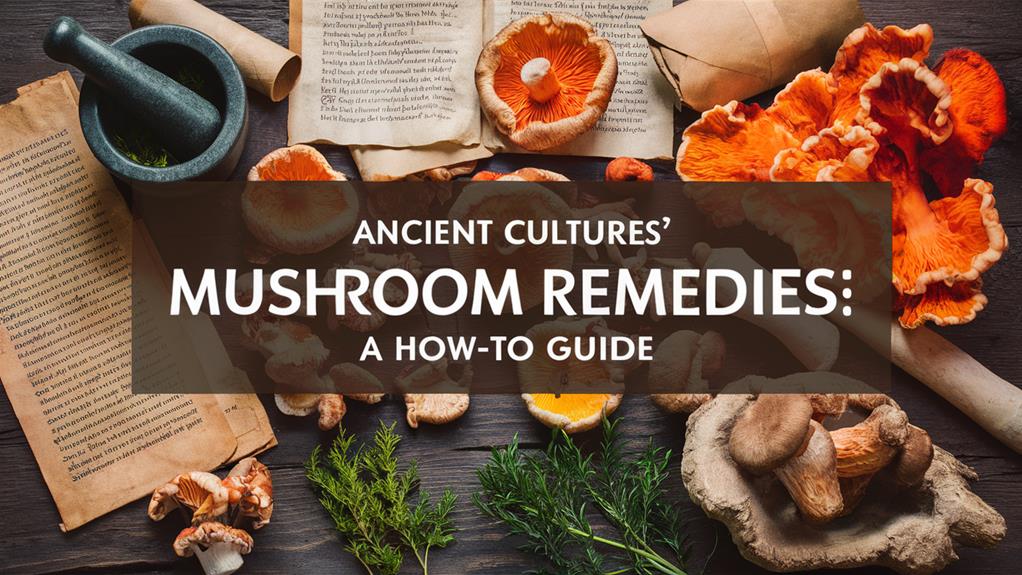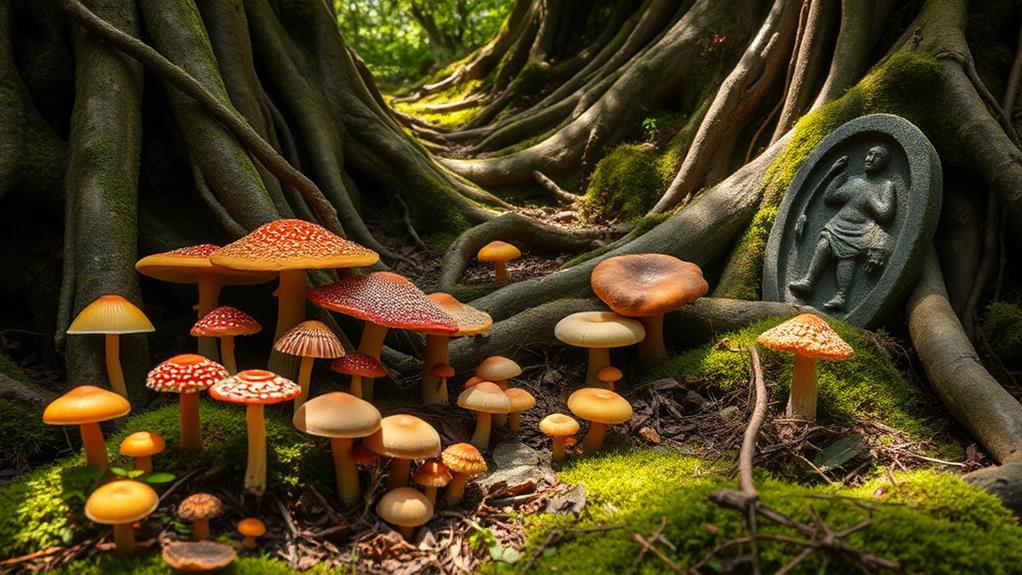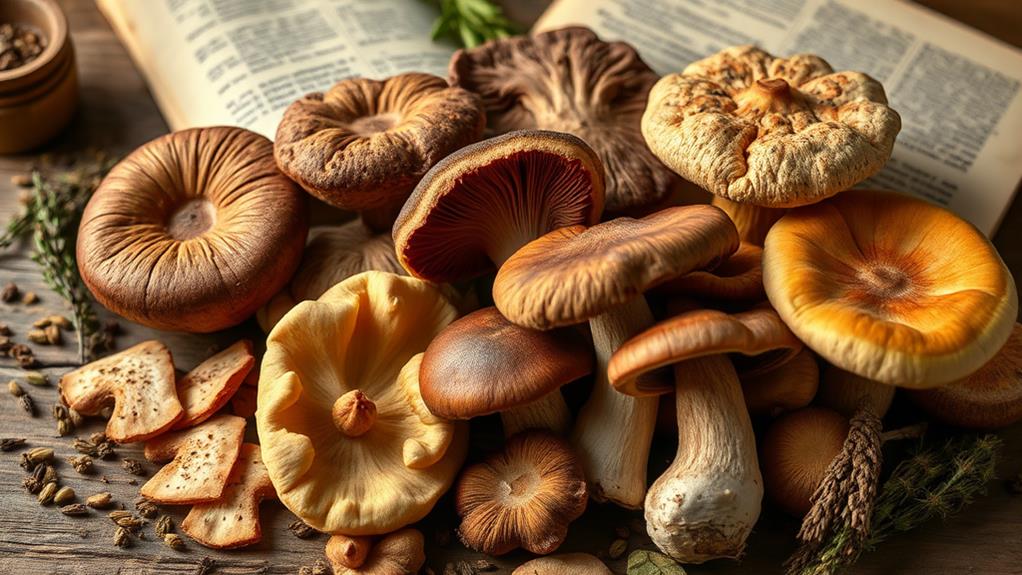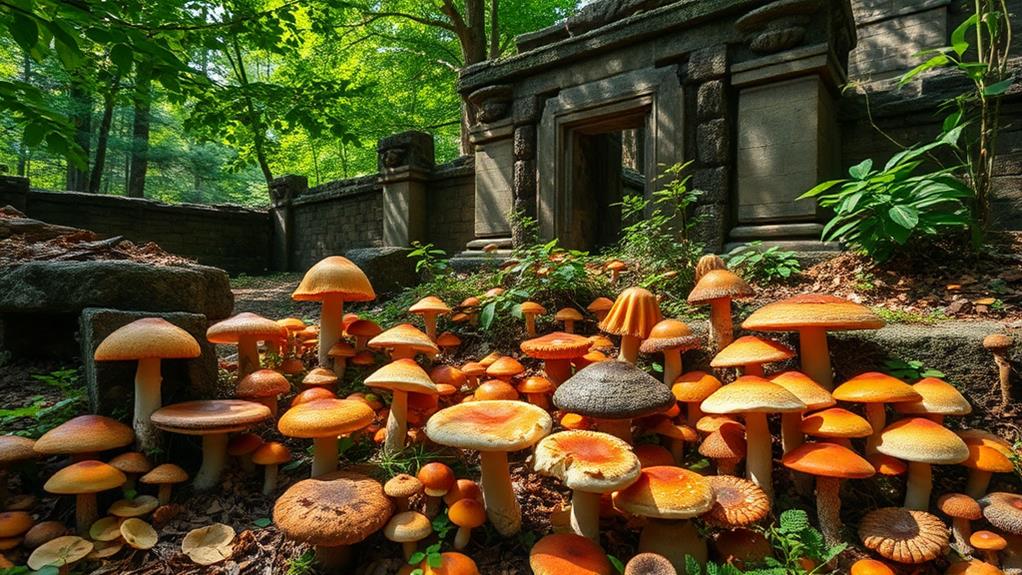
Ancient cultures, such as the Egyptians and Chinese, recognized mushrooms for their healing abilities. They used various types, like Reishi for immunity and Lion's Mane for brain health. To create your remedies, start by using dried mushrooms, grinding them into a fine powder. You can make infusions by simmering the mushrooms in water or alcohol to extract their beneficial compounds. Other methods include brewing mushroom tea or mixing with quality honey for added flavor. By tapping into these traditional practices, you can enhance your wellness routine and discover even more about the diverse benefits of these natural gifts.
Historical Significance of Mushrooms

Mushrooms have played a crucial role in various cultures throughout history, and you might be surprised by their long-standing significance in medicine. Ancient civilizations, like the Egyptians and Greeks, recognized the medicinal properties of mushrooms. They often used these fungi for healing purposes and recorded their benefits in historical texts.
For instance, Hippocrates, known as the father of medicine, classified the amadou mushroom (Fomes fomentarius) as an anti-inflammatory around 450 BCE, showcasing its early medicinal use. Additionally, various types of medicinal mushrooms, such as reishi and turkey tail, have been celebrated for their therapeutic effects, particularly in enhancing the immune response against ailments like cancer medicinal mushrooms and cancer support.
In traditional Chinese medicine, the importance of mushrooms is reflected in the work of Tao Hongjing, a 5th-century scholar who documented various medicinal mushrooms. His writings highlight their therapeutic agents and the belief in their healing powers.
Additionally, archaeological findings suggest that early humans used mushrooms for health practices, indicating their integral role in wellness for thousands of years.
Indigenous North Americans also employed puffball mushrooms as wound healers, demonstrating the deep-rooted connection between mushrooms and traditional healing practices across different cultures.
This historical significance reveals how mushrooms have been valued not only for their culinary uses but also for their medicinal properties throughout the ages.
Traditional Uses Across Cultures
Throughout history, various cultures have harnessed the power of mushrooms for their health benefits. The ancient Egyptians revered mushrooms for their medicinal properties, as shown in hieroglyphics that highlight their importance in health practices.
In traditional Chinese medicine, mushrooms like Reishi and Shiitake have been used for centuries to boost immunity and promote wellness, with texts documenting their uses since the 5th century. These mushrooms are known for their immune-boosting properties and other therapeutic effects that have been recognized over millennia.
Indigenous North American cultures recognized the healing potential of puffball mushrooms, using them for their natural antibacterial properties to treat wounds effectively.
Hippocrates, the Greek physician, classified the amadou mushroom as an anti-inflammatory remedy around 450 BCE, demonstrating the early recognition of mushrooms as medicine.
In Siberian and Tibetan medicine, various mushrooms are valued for their adaptogenic properties, helping the body manage stress and improve vitality.
These traditional uses across cultures show that mushrooms aren't just food, but also powerful medicinal allies. By understanding these historical practices, you can appreciate how mushrooms have played a vital role in health and healing throughout time.
Key Medicinal Mushrooms

The world of medicinal mushrooms offers a diverse array of options for enhancing your health. Among these, reishi is often called the "mushroom of immortality." It's revered for boosting your immune system, reducing anxiety, and promoting better sleep.
This remarkable mushroom is also known for its immune system enhancement and stress-reducing properties, making it a valuable addition to any wellness routine.
Chaga, rich in antioxidants, serves as a powerful ally for immunity and digestion.
Lion's Mane stands out for its cognitive benefits; it can improve focus and support nerve health, potentially protecting against neurodegenerative diseases.
Turkey Tail is another key player, valued for its immune-strengthening properties and gut health support, especially useful for those undergoing cancer treatments.
Lastly, cordyceps is popular with athletes due to its ability to increase energy and endurance while also helping the body respond to inflammation.
Each of these medicinal mushrooms has unique uses and benefits, making them essential in the cultivation process for health remedies.
Whether you're seeking to enhance your immune system or improve cognitive function, incorporating these mushrooms into your routine can address various medicinal purposes.
As you explore their benefits, you'll discover a natural way to support your overall health and well-being.
Preparation Methods for Remedies
When it comes to preparing mushroom remedies, getting the process right can significantly boost their health benefits. Start by using dried medicinal mushrooms; grinding them into a fine powder increases the surface area, which helps extract beneficial compounds more effectively.
You can try various extraction methods, with water and alcohol being the most common solvents. Each method isolates active compounds like beta-glucans and terpenoids, enhancing the effectiveness of your remedies.
Another great preparation method is to make tea by simmering whole mushrooms in water, allowing for a gentle extraction of soluble compounds. This process not only captures the health benefits of the mushrooms but also provides a soothing drink.
If you want to elevate your infusion, consider using high-quality medicinal honey as a base; it preserves active compounds while adding its own health benefits.
Once you've prepared your remedies, remember to store the final product in airtight containers. This step is crucial, as minimizing oxygen exposure helps prevent the degradation of active components over time.
Modern Applications and Insights

As modern science uncovers the benefits of medicinal mushrooms, you're likely to find their ancient uses validated in compelling ways. These mushrooms, once relied upon for their healing properties, are now recognized for their potential in modern applications.
For instance, Lion's Mane is celebrated for promoting neural regeneration, echoing traditional uses that date back centuries.
Recent advancements in extraction techniques, such as alcohol and water extractions, enhance the bioavailability of the beneficial compounds found in these fungi. This means that the health products you see on shelves today, like teas, extracts, and functional foods, are packed with potent properties.
Research has identified specific active compounds, including beta-glucans and terpenoids, which support immune health and offer anti-inflammatory benefits, aligning perfectly with ancient remedies.
The growing interest in mushroom medicine reflects a broader trend toward natural remedies. As more people seek options that promote wellness, these ancient remedies are being adapted for modern health applications.
Conclusion
In exploring ancient cultures' use of mushrooms, you've uncovered a treasure trove of knowledge. These natural wonders, woven into the fabric of history, offer a gentle reminder of nature's healing gifts. By learning their traditional applications and how to prepare them, you can connect with the wisdom of those who came before us. Embracing these time-honored remedies may just lead you to a healthier, more balanced life, blending the past with the present in a truly harmonious way.
